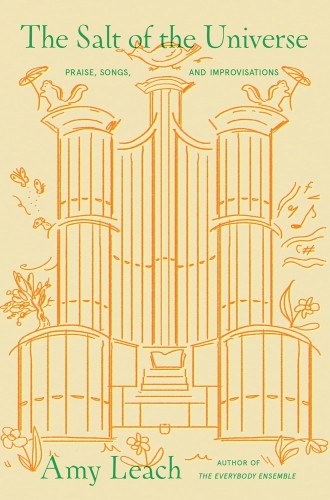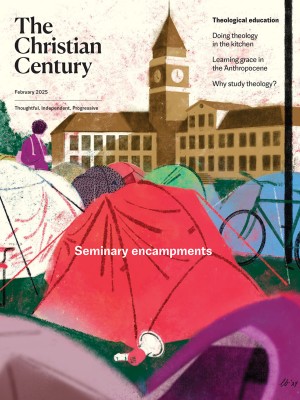The magic of Amy Leach’s world
The essayist playfully contrasts the apocalyptic, fundamentalist worldviews of her childhood with the teeming abundance of life that she found later.

The Salt of the Universe
Praise, Songs, and Improvisations
Essayist Amy Leach grew up in a Seventh-day Adventist home and church, and her third book is dedicated to unpacking that personal history in the same winsome style with which she unpacks the habits of peas and platypuses in Things That Are and with the same ad hoc, devil-may-care attitude that marks The Everybody Ensemble.
Leach playfully fills The Salt of the Universe with contrasts between the apocalyptic, fundamentalist worldviews of her childhood and the teeming abundance of life that she found later. “While the apocalypse is sexy short-term, long-term it’s a slog,” she writes. She contrasts William Miller, who spent his life waiting for the end of the world, with composer Felix Mendelssohn. Mendelssohn “was not one of those piners for the end: he had a concerto in his head. My theory is that the apocalypse appeals primarily to people who have no concerto in their heads.”
Read our latest issue or browse back issues.
She contrasts Seventh-day Adventist prophet and persnickety dictator of everyday life Ellen G. White with wild woman of the word Emily Dickinson. Dickinson is always trying to set herself free, while White is always locking people up in little rule cages. But Leach also notes that she came to Dickinson through the strictures of White’s worldview. She was teaching literature at an Adventist college and was prevented from teaching fiction, so she started teaching poetry, and that led her to a passion for Dickinson.
The book opens with two epigraphs: “Do not eat largely of salt; give up bottled pickles,” says White. “Salt is good, but if it loses its saltiness, how can you make it salty again?” says Jesus. The disciples of Jesus were nothing, Leach writes, if not salty. These were people who pushed life to its edges. “Because when they fished, they fished all night damn it, and when they washed his feet with perfume, they spent all their money on the finest perfume they could find damn it, and when they followed Jesus, they followed him damn it even onto the surface of the water. Those disciples were headlong.”
Just as White led Leach to Dickinson, the Bible led Leach out of her Adventist worldview. The truth of the Bible, she writes, is “too large, its wisdom too manifold, its questions too real.” And the people who populate the Bible have little in common with White. They drink wine and eat salt. They include Job, who insisted on the truth of his own experience without any dogma. Leach left Adventism when she heard an Adventist preacher say in a sermon, “The individual is nothing—the institution is everything.” “‘I’m ceded—I’ve stopped being Theirs,’” she quotes Dickinson. “That was the day I left the Institution,” she explains, “and joined the Individuals, like Jesus, Rahab, Job, and Abraham, and that red fox, that real fox, skirting the churchyard on her way to find fresh cold streams of water.”
Leach’s contrasts are funny and inspiring and build much of the book’s humorous flow, but these essays are not really about Adventism. Sprinkled with Adventism, they are about whatever sweeps Leach up exuberantly in the moment: Stravinsky and willows, Montana and singing in church. She doesn’t stay with any subject for long, except for life itself and how it unfolds without any necessary reference to apocalypticism.
The book is punctuated by notes, as if she couldn’t bring herself to delete any of her jokes. Each essay ends with mini-elaborations on phrases from that essay. For example, at the end of the essay “Thanks for Nothing,” she includes a note elaborating on the phrase “violin propaganda,” which appears midway through the essay. She writes, “It is because of my experience with violin propaganda that I am not absolutely against propaganda. I am all for violin propaganda, bongo propaganda, panda propaganda, and also vegetable propaganda like I see on Sesame Street.” In order to appreciate this book, you have to relax and be willing to laugh as you see words like panda and propaganda line up next to each other for no reason at all.
This is the gift of Leach’s writing: she uses language to make magic out of the world. Time spent with her is time spent dancing with lilies and ducks, pickles and prairie dogs, in a world full of humor and gifts too precious to be destroyed or denied.







